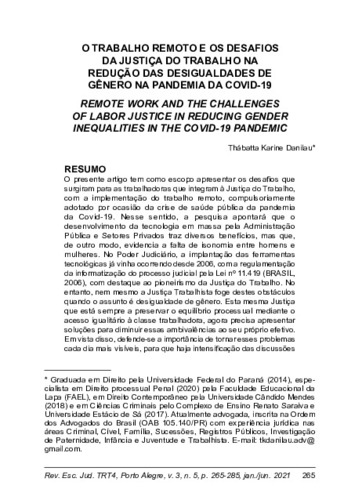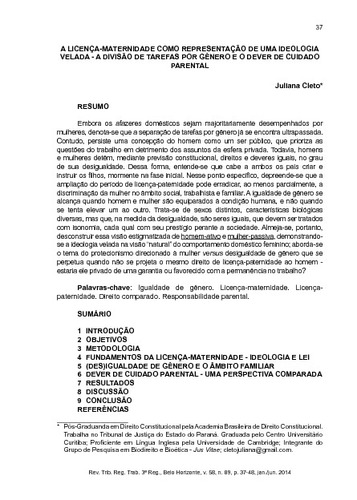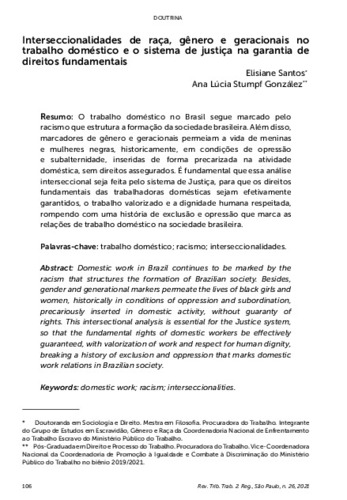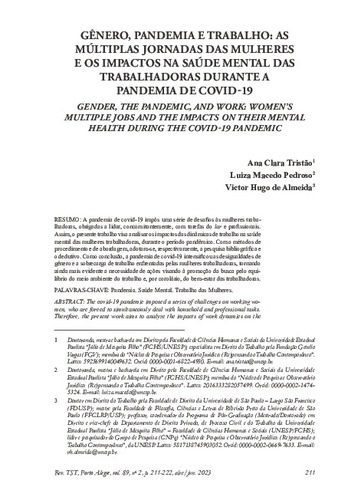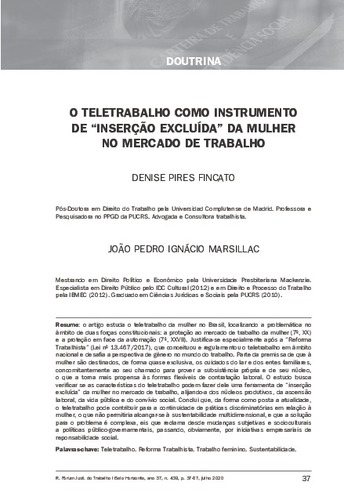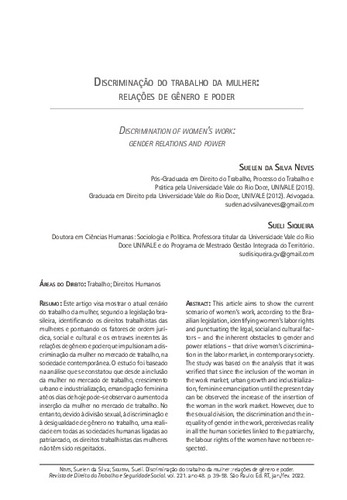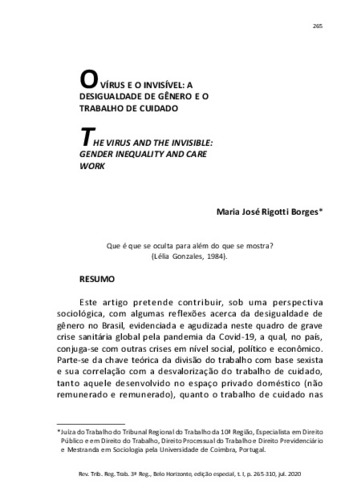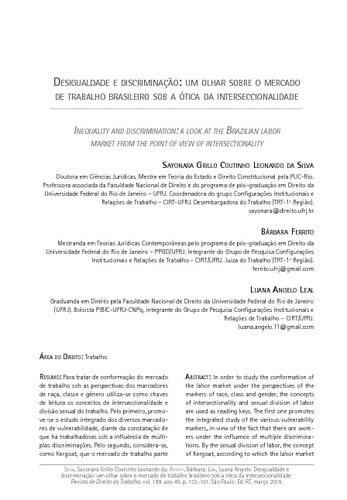Artigo de periódico
O trabalho remoto e os desafios Justiça do trabalho na redução das desigualdades de gênero na pandemia da Covid-19
| dc.contributor.author | Danilau, Thábatta Karine | |
| dc.date.accessioned | 2023-12-04T21:27:53Z | |
| dc.date.available | 2023-12-04T21:27:53Z | |
| dc.date.issued | 2021-06 | |
| dc.identifier.citation | DANILAU, Thábatta Karine. O trabalho remoto e os desafios da Justiça do trabalho na redução das desigualdades de gênero na pandemia da Covid-19 = Remote work and the challenges of labor justice in reducing gender inequalities in the Covid-19 pandemic. Revista da Escola Judicial do TRT4, Porto Alegre, v. 3, n. 5, p. 265-285, jan./jun. 2021. | pt_BR |
| dc.identifier.uri | https://hdl.handle.net/20.500.12178/225038 | |
| dc.description.abstract | [por] Apresenta os desafios que surgiram para as trabalhadoras que integram à Justiça do trabalho, com a implementação do trabalho remoto, compulsoriamente adotado por ocasião da crise de saúde pública da pandemia da Covid-19. Nesse sentido, a pesquisa apontará que o desenvolvimento da tecnologia em massa pela administração pública e setores privados traz diversos benefícios, mas que, de outro modo, evidencia a falta de isonomia entre homens e mulheres. No poder judiciário, a implantação das ferramentas tecnológicas já vinha ocorrendo desde 2006, com a regulamentação da informatização do processo judicial pela Lei n. 11419 (BRASIL, 2006), com destaque ao pioneirismo da Justiça do trabalho. No entanto, nem mesmo a Justiça trabalhista foge destes obstáculos quando o assunto é desigualdade de gênero. Esta mesma Justiça que está sempre a preservar o equilíbrio processual mediante o acesso igualitário à classe trabalhadora, agora precisa apresentar soluções para diminuir essas ambivalências ao seu próprio efetivo. Em vista disso, defende-se a importância de tornar esses problemas cada dia mais visíveis, para que haja intensificação das discussões públicas e do amparo estatal voltados à promoção de melhores condições e dignidade às mulheres – mães, cuidadoras, estudantes e trabalhadoras –, alinhando-se à Resolução n. 255/2018 do CNJ (BRASIL, 2018), independentemente do cenário em que o mundo se debruça. | pt_BR |
| dc.description.abstract | [eng] The purpose of this article is to present the challenges that have arisen for workers who are part of the Labor Court with the implementation of remote work compulsorily adopted during the public health crisis of the Covid-19 pandemic. In this sense, the research will point out that the development of mass technology by the public administration and private sectors brings several benefits, but that otherwise shows the lack of equality between men and women. In the Judiciary Branch, the implementation of technological tools have been taking place since 2006 with the regulation of the computerization of the judicial process by Law n. 11.419 (BRASIL, 2006), with emphasis on the Labor justice pioneering work. However, not even the Labor Court escapes these obstacles when it comes to gender inequality. This same Justice, which is always preserving the procedural balance through equal access to the working class, now needs to come up with solutions to reduce these ambivalences to its own force. In view of this, the importance of making these problems increasingly visible is defended so that there is an intensification of public discussions and state support aimed at promoting better conditions and dignity for women - mothers, caregivers, students and workers -, observing CNJ Resolution n. 255/2018 (BRASIL, 2018), regardless of the situation scenario in which the world live. | pt_BR |
| dc.description.tableofcontents | Uma questão de justiça dentro do próprio sistema digital de justiça: A regulamentação do teletrabalho na justiça trabalhista. Os efeitos da pandemia nas desigualdades de gênero. Quarentena e teletrabalho feminino no âmbito do poder judiciário trabalhista | pt_BR |
| dc.language.iso | pt_BR | pt_BR |
| dc.relation | Brasil. Lei n. 11.419, de 19 de dezembro de 2006 | pt_BR |
| dc.relation | Resolução n. 255/CNJ, de 4 de setembro de 2018 | pt_BR |
| dc.relation.ispartof | Revista da Escola Judicial do TRT4: vol. 3, n. 5 (jan./jun. 2021) | pt_BR |
| dc.relation.uri | https://www.lexml.gov.br/urn/urn:lex:br:federal:lei:2006-12-19;11419 | pt_BR |
| dc.relation.uri | https://hdl.handle.net/20.500.12178/143891 | pt_BR |
| dc.subject | Teletrabalho, Brasil | pt_BR |
| dc.subject | Mulher trabalhadora, Brasil | pt_BR |
| dc.subject | Justiça do trabalho, Brasil | pt_BR |
| dc.subject | Igualdade de gênero, Brasil | pt_BR |
| dc.subject | Covid-19, Brasil | pt_BR |
| dc.title | O trabalho remoto e os desafios Justiça do trabalho na redução das desigualdades de gênero na pandemia da Covid-19 | pt_BR |
| dc.title.alternative | Remote work and the challenges of labor justice in reducing gender inequalites in the Covid-19 pandemic | pt_BR |
| dc.type.genre | Artigo de periódico | pt_BR |
| dc.identifier.rvbisys | 001223550 | |
| dc.relation.ispartoflink | https://hdl.handle.net/20.500.12178/224664 | pt_BR |
This item appears in the following Collection(s)
-
Artigos9566


